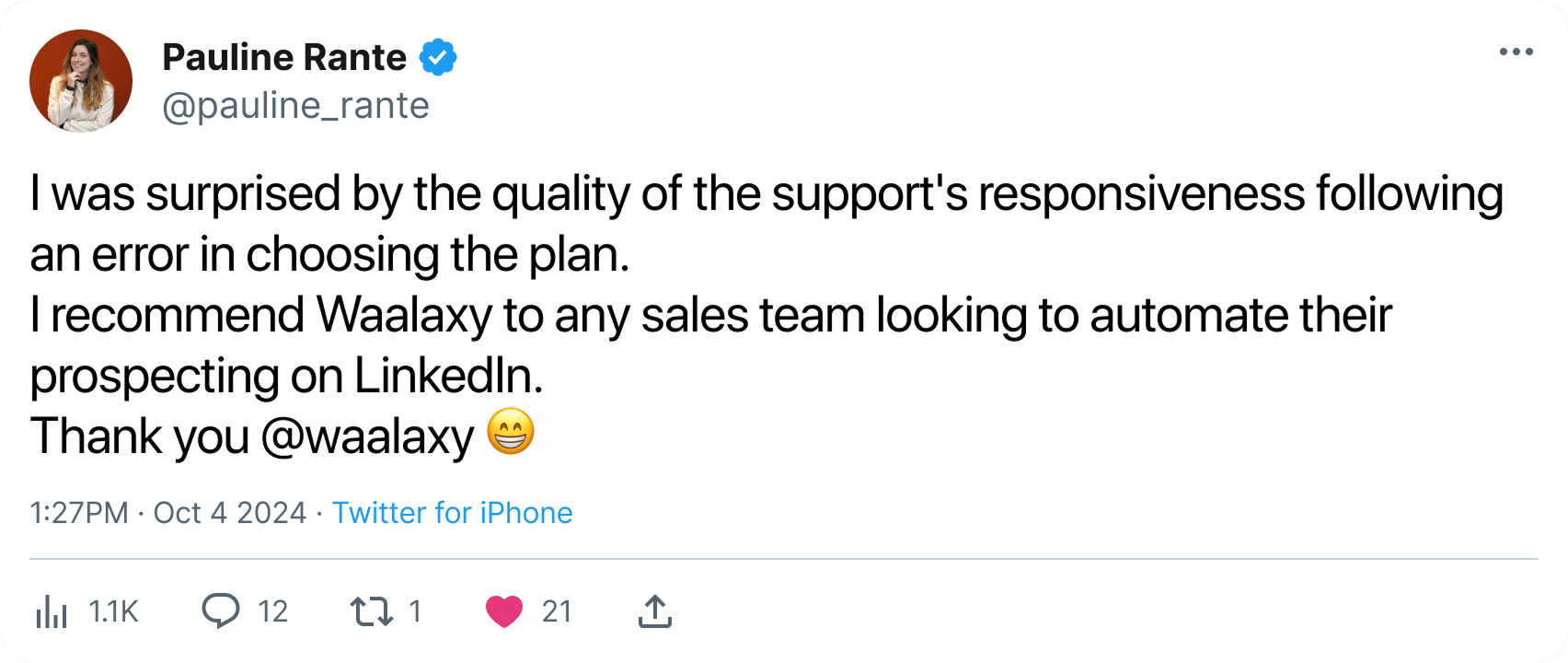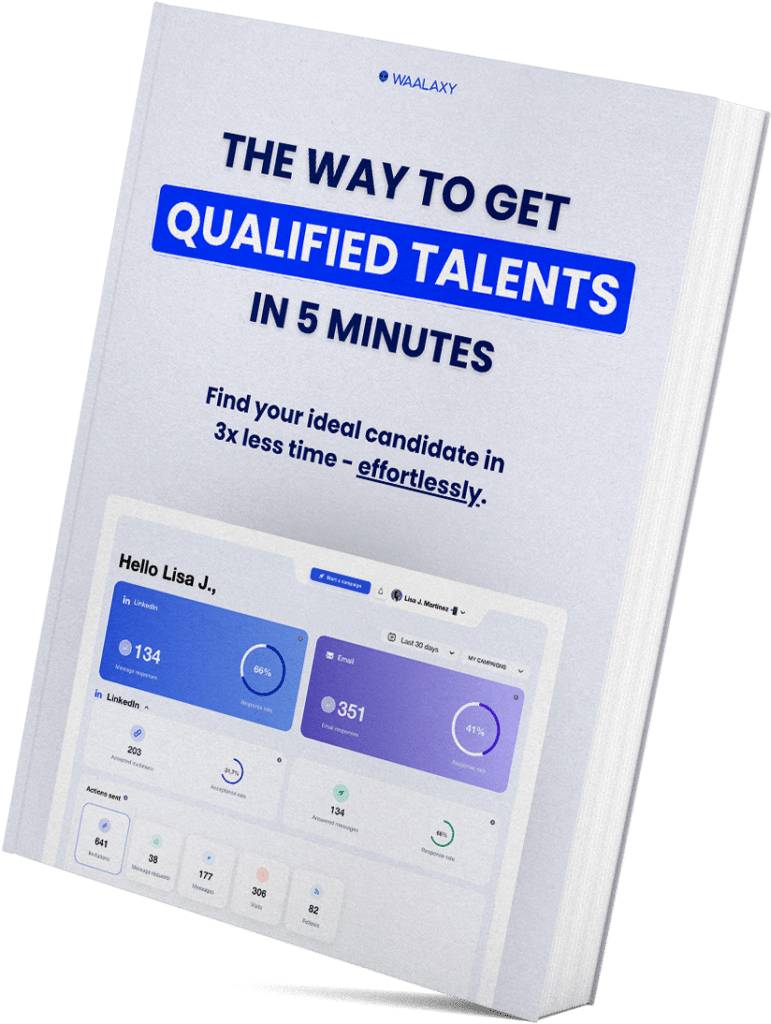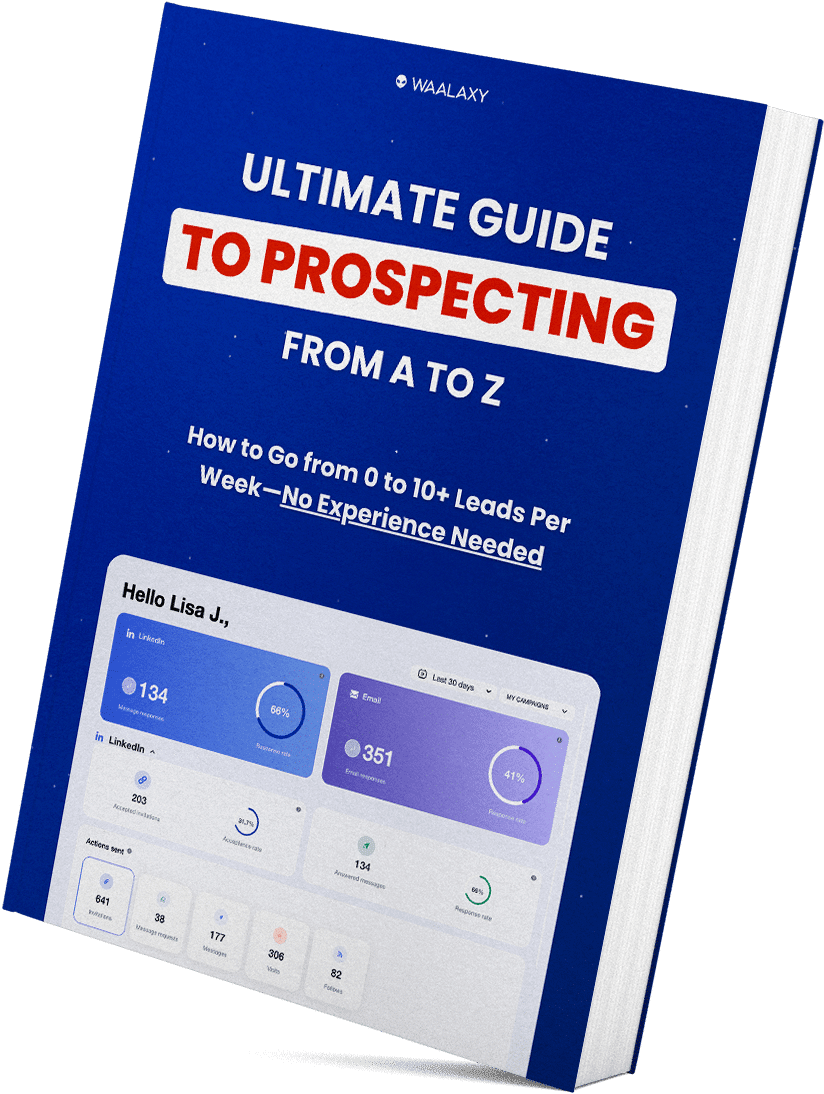Launching a recruitment campaign isn’t just an HR affair. 👀 Imagine attracting talent who have the hardskills and fit in perfectly with your team’s culture!
It’s a strategy used to attract 🧲, assess and hire talent for a company. It can be broken down into 3 objectives:
- 1️⃣ Fill a position.
- 2️⃣ Strengthen the employer brand.
- 3️⃣ Attract the best candidates.
In short, we’ll explain how to launch your campaign in 9 steps + innovative examples! 😇
Grab your best latte and happy reading! (Reading time: 5 minutes) ✨.
Launch a recruitment campaign in 9 steps
But why launch a recruitment campaign at all? Well, in an increasingly competitive job market, simply publishing an ad, sourcing and waiting for applications is no longer enough…
A recruitment campaign will enable you to target 🎯 precisely the profiles you’re looking for, reach candidates who aren’t necessarily looking for a job, and above all, stand out from the competition. 💪🏼
Let’s go through the 9 steps! 👇🏼
1) Define the position to be filled
Here, we’ll detail the responsibilities, daily tasks and objectives to be achieved.
Make no mistake about this step, as it lays the foundation for the entire recruitment process.
In fact, if you’re clear and precise about the job’s duties from the outset, you’ll reduce the risk of misunderstandings, and you’ll be sure that candidates understand what’s expected of them. 😇
To do this, you can work with the people involved to understand the real needs:
- What specific skills are needed?
- What are the minimum qualifications?
Then define the working conditions, level of responsibility and opportunities for advancement within your company. 📈
This way, you filter out from the outset those whose skills or expectations don’t match up, handy no? 👀
2) Define the candidate’s profile
This step confirms that you’re attracting qualified candidates who are aligned with your company’s culture, employer brand and value. In reality, it’s like drawing a sketch of the ideal person for the job. 🤖
First, identify 🔎 the role’s technical skills. These can be:
- Specific qualifications.
- Years of experience (junior, senior).
- Specific knowledge for the position (programming language, design tools, etc.).
Don’t limit yourself to technical skills.
Soft skills are just as important! Does the job require good communication skills, adaptability, and initiative? 👀
In addition to skills, think about the candidate’s personal characteristics. Ask yourself whether it’s essential for the person to be proactive, creative, or results-oriented. 🤔
Finally, ask yourself what would attract a candidate to your company? Is it the fact of :
- 🖥️ Work on innovative projects?
- ⚖️ Work-life balance?
- 🦋 Opportunities for personal and professional development?
Example: you’re recruiting a digital project manager, here’s his candidate profile. ⬇️
| Criteria | Details |
|---|---|
| Training | Training in project management |
| Experience | 5 years’ experience in digital marketing |
| Technical skills | Ability to manage multi-functional teams, strong affinity with new technologies |
| Behavioral skills | Dynamic, adaptable to change, strong sense of initiative |
| Personal characteristics | Proactive, results-oriented, creative |
| Values and culture | Aligned with innovation and teamwork, shares company values |
| Professional motivations | Motivated by the development of disruptive projects, attracted by growth opportunities and work-life balance |
3) Write the job offer
The job title must be precise and understandable. Avoid titles that are too technical or internal to the company, which may not be recognized by potential candidates.

It must immediately grab attention and give a clear idea of the role! 😇
Next, briefly describe the company. This section should offer an overview of your mission, your values, and what sets your company apart from the rest!
Pshiit, highlight what might attract a candidate, such as company culture or benefits. 👀
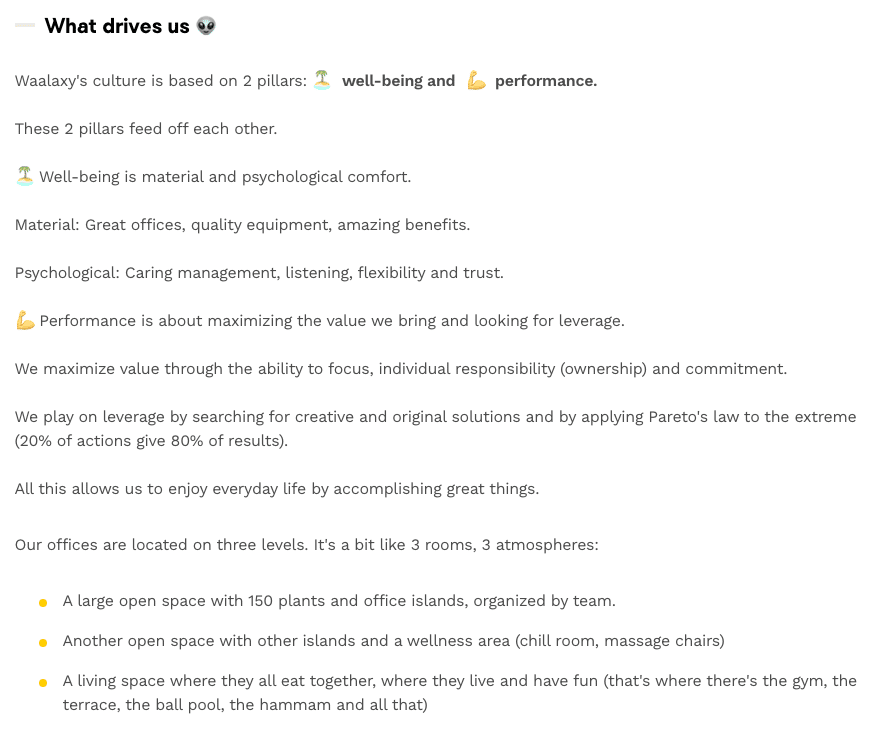
As for the description of responsibilities, you can list the main tasks and underline the challenges of the position. 💪🏼
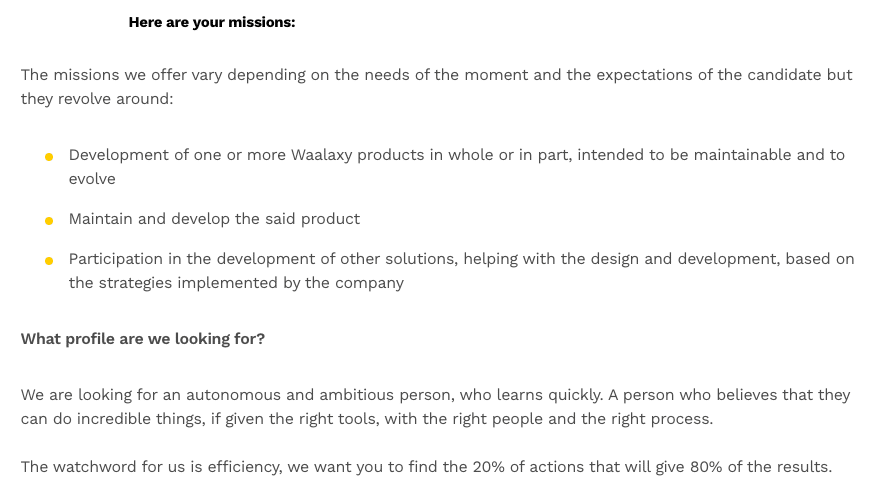
Qualifications and skills required should be stated (only if this is an important criterion in your company). To do this, separate essential skills from those that are merely desirable.
This allows candidates to better assess whether they fit the profile you’re looking for.
Finally, don’t forget to specify the location of the position, the type of contract or any other details you feel are important! 🦋
4) Create candidate personas
If you didn’t know, a candidate’s persona is a fictitious profile that represents your ideal candidate. This marketing technique helps you better understand candidates’ motivations, behaviors and expectations, so you can better attract them. 🧲
If you don’t know how to do this, it’s very simple. Start by analyzing what your current employees do (especially those in positions similar to the one you’re looking for) and identify commonalities:
- Career path.
- Challenges faced.
- Skills.
- Values.
- Desires.
This information will help you in your quest to find the ideal candidate.
Finally, don’t hesitate to segment your personas according to the different types of profiles you want. Let me explain! ⬇️
You can create a persona for a young graduate looking for his or her first professional experience, and another for an experienced professional looking to move into a new sector. 🦋
In any case, for each one, don’t hesitate to identify 🔎 :
- 🌞 The elements that might convince them to apply.
- 🩵 The messages that match them most closely.
- 📢 Preferred communication channels.
5) Distribute the job advert
This step is very important because it’s not just about posting the ad on as many platforms as possible, but selecting the most relevant channels to reach your target audience! 👀
Already, start by identifying the job boards where you can find your nugget candidates. ✨ I’m thinking in particular of platforms like Welcome to the Jungle, Indeed, or LinkedIn. 👀
There’s a quick and easy strategy for sending out your job postings: prospecting. 🚀
We’re going to show you how to use a tool that’s going to make your recruitment automation easier: Waalaxy. 👽
If you don’t know what Waalaxy is, it’s an automated prospecting tool for LinkedIn and E-mail, designed to be easy to use and accessible to everyone. 👽
Back to business, go to LinkedIn and search for your profile by mentioning, for example, job title, location, industry sector and profile language. 👇🏼
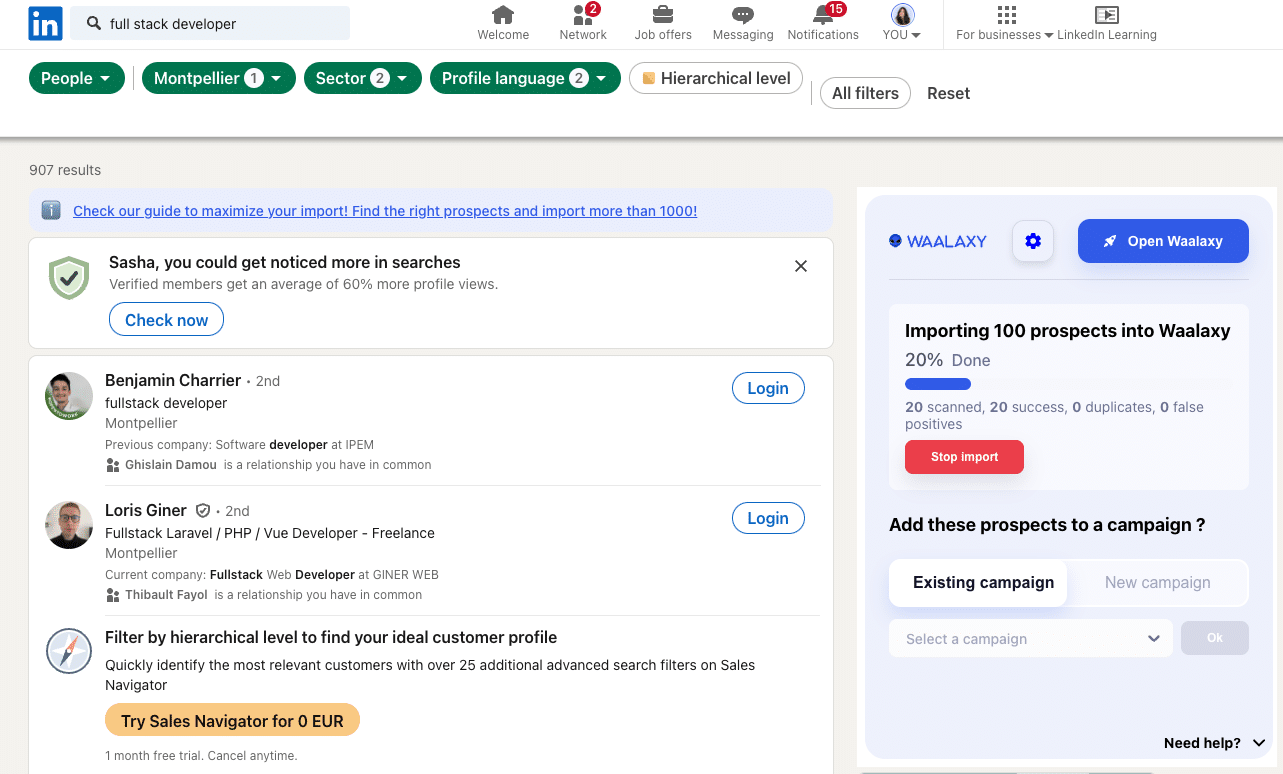
Then import them directly into Waalaxy using the Chrome extension. 😇
Once your prospects have been imported, you can create your campaign (over 99 sequences). We have chosen « Invitation + Message ».
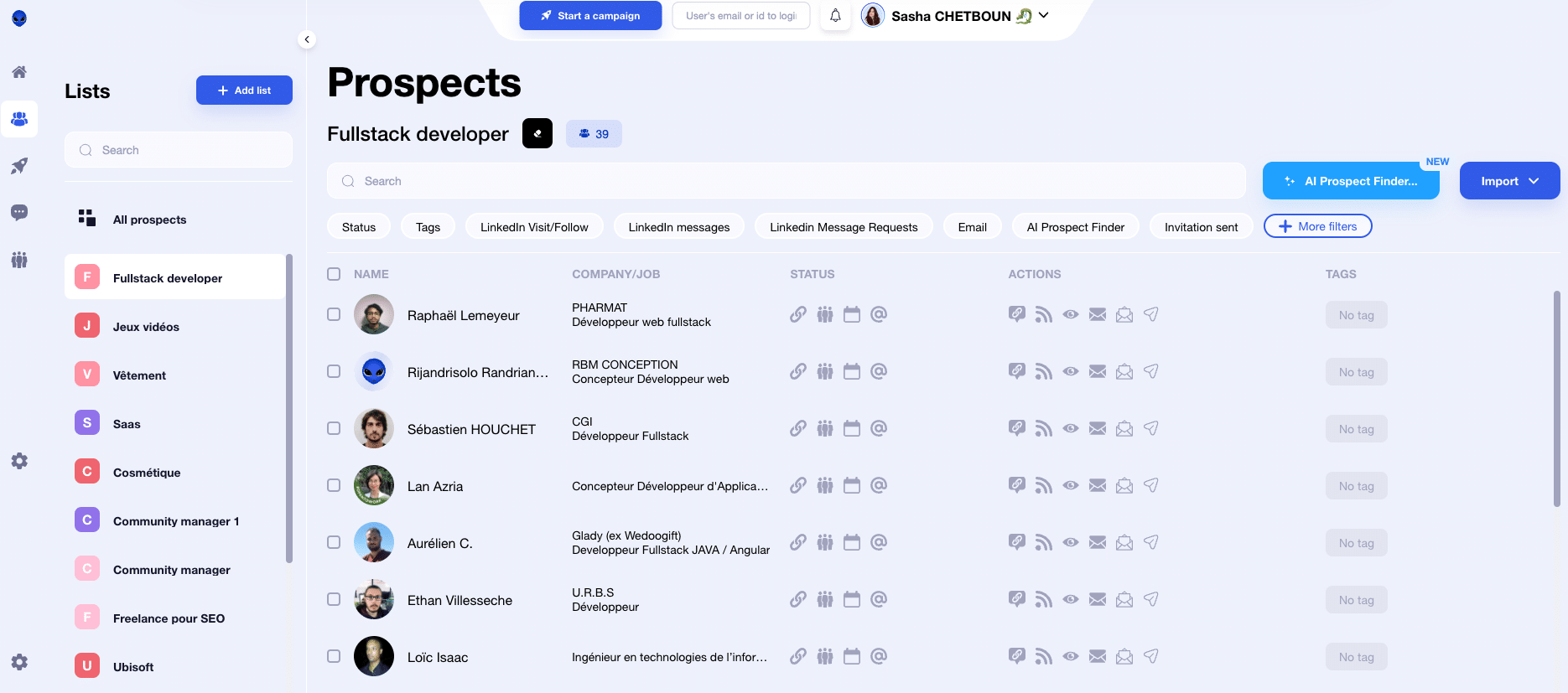
Next, set the parameters of your campaign and, most importantly, write an impactful, relevant message that makes your prospects want to apply!
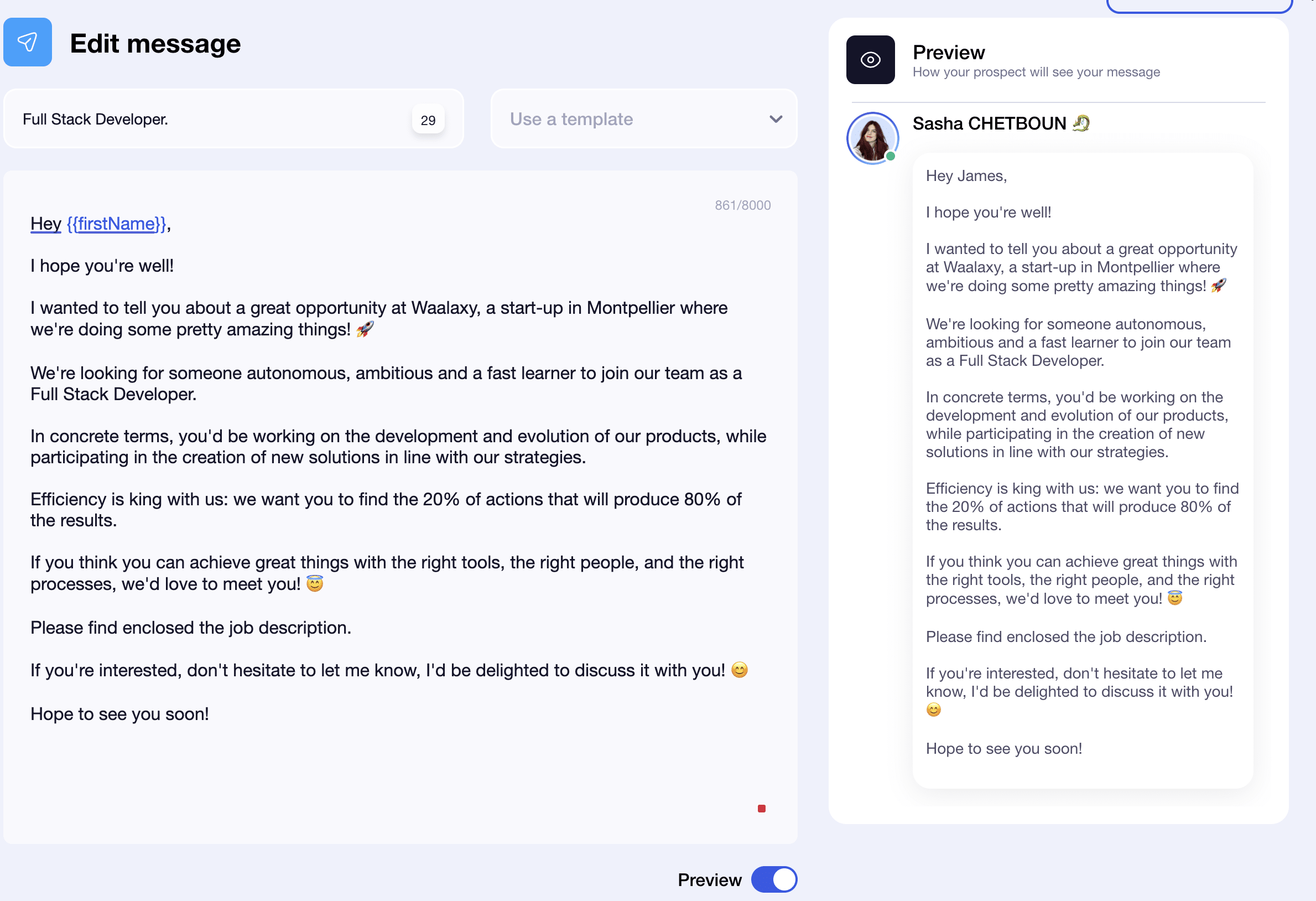
To find out more about the tool, click here! 👇🏼
6) Track candidate interactions
Once your ad has been posted and the applications start coming in, you need to keep a close eye on the interactions. 👀
To do this, you can use an application tracking system (ATS) to centralize all applications and interactions.
It’s advisable to respond promptly to every application. Even an automated acknowledgment can make a difference, as it shows candidates that their application has been received and is being considered. 😇
But wait, we’re not just talking about managing applications here. Think also of the possible questions or requests for information that candidates may have by e-mail, or even on social networks. 🦋
Responding quickly and sincerely strengthens your company’s image and improves the candidate’s experience.
7) Select resumes
This step allows you to filter the candidates to define those who best match the positions! 😇
A little tip: establish selection criteria based on the skills, experience and qualifications you defined in the previous steps.
But that’s not all: take the time to evaluate the soft skills that jump out at you 👁️, such as :
- Adaptability.
- Leadership.
- Communication skills.
These elements can be decisive for the long-term success of a position.
Finally, once you’ve shortlisted the CVs, get ready to enter the interview phase! ✨
8) Conducting interviews
Last but not least, the interviews! 💪🏼
Prepare for your interviews with targeted questions 🎯 that address both specific skills for the position, and soft skills.
For example, you can ask behavioral questions that assess how the candidate has handled similar situations in the past. 👀
The eighth stage of the recruitment process involves conducting interviews. This phase is crucial for assessing both the candidates’ technical skills, and their fit with the company’s culture and ability to integrate into the team.
During the interview, observe the candidate’s communication, attitude and enthusiasm.
Did you know that there are software programs that allow you to make a selection of CV?
How can you do this? Well, thanks to filters that you decide on, such as: 👇🏼
- Keywords.
- Specific skills.
- Professional experience.
- Defined criteria.
We recommend these two tools: 👇🏼
1️⃣ Workable: this tool uses artificial intelligence to analyze and sort candidates’ CVs. It also offers candidate recommendations based on these criteria, which can help you focus on certain profiles. 👀

2️⃣ Teamtailor: this tool allows you to quickly filter applications to eliminate those that don’t match your criteria, and therefore reduces the time spent on pre-selection.

Take detailed notes for each interview to compare candidates objectively. 📝
9) Analyze the recruitment campaign
Now we’ve reached the final stage of a recruitment campaign: analysis! 🤓
To do this, examine key performance indicators (KPIs) such as:
- 🔵 Conversion rate (candidates interviewed vs. hired).
- 🟣 Number of applications received.
- 🔵 Recruitment time.
- 🟣 Cost per hire.
📢 Breaking news: a short break in the program to quickly return to Waalaxy. 📢
Directly on the dashboard, you have the statistics of your campaign of quickly with some KPI! 👀
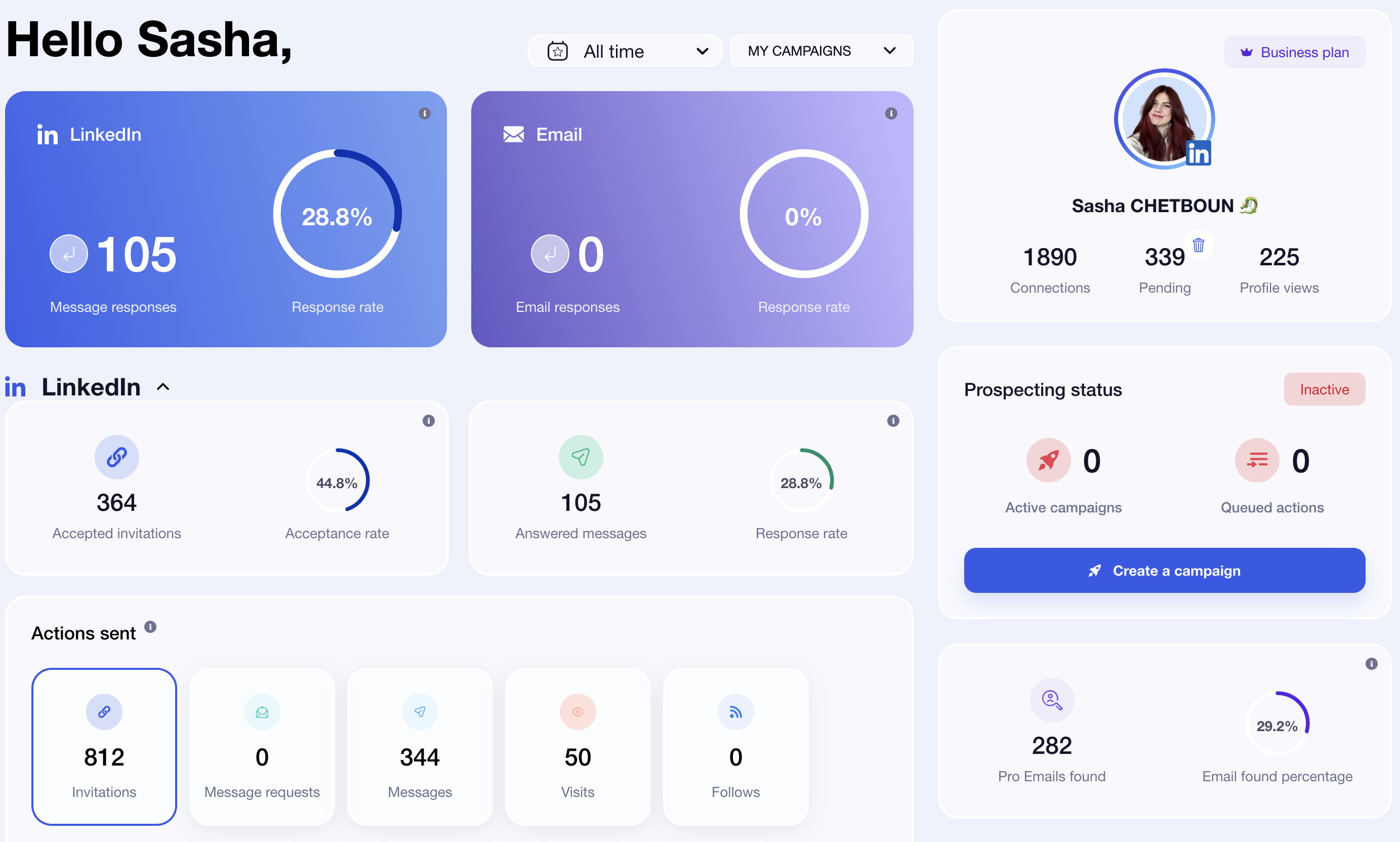
📢 End of breaking news, thank you for listening.📢
Once you’ve recruited your candidates, ask yourself: are they a good fit for the job and the company? 🤔
To do this, don’t hesitate to gather as much feedback as possible from stakeholders, not forgetting the candidates. 🌞
Finally, a word of advice: document your successes and failures, so that you can adjust your strategies to improve your next campaigns. 💪🏼
7 examples of innovative digital recruitment campaigns
Now that you’re a recruitment plan whiz 🃏, let’s analyze some recruitment campaigns that worked! 😇
Example 1: Waalaxy
Violette Léger (HR at Waalaxy) regularly posts anecdotes about the company, its values and other stories on LinkedIn.
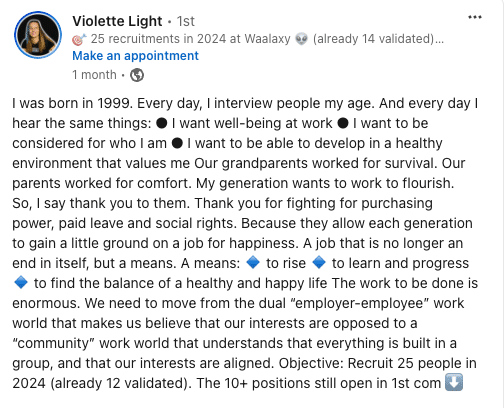
In this post, she thanks previous generations and creates an emotional connection.
Why ? 🤔
Well, this empathy helps to humanize the company and attract 🧲 candidates who share these values (incidentally, she mentions at the end that Waalaxy is recruiting). 👀
By publishing on LinkedIn, the approach moves from a simple job offer to a genuine promise of company culture. 😇 And if you want to go further, you write a job advertisement.
Example 2: McDonald’s recruitment campaign

In this campaign, McDonald’s doesn’t show off its restaurants or the latest trendy menu, but rather what young people call the brand, nodding to the campaign message, Make It Yours. 🍟
It’s easy to see that this is more than just a fast-food restaurant, it’s a place where young people can turn and make themselves at home. 🏠
It’s also a reminder that leaving home or going to university is a luxury many can’t afford.
Example 3 : Army recruitment campaign
The campaign is designed to attract specialized civilian talent who may not be interested in traditional military careers, but who may be motivated by unique scientific challenges. 💪🏼

Indeed, the campaign is clearly geared towards people with research skills in glaciology or geophysics. ❄️
The slogan proves that this work allows candidates to advance in their field, take on unique definitions and contribute to world-class projects. 😇
Example 4: Disney recruitment campaign
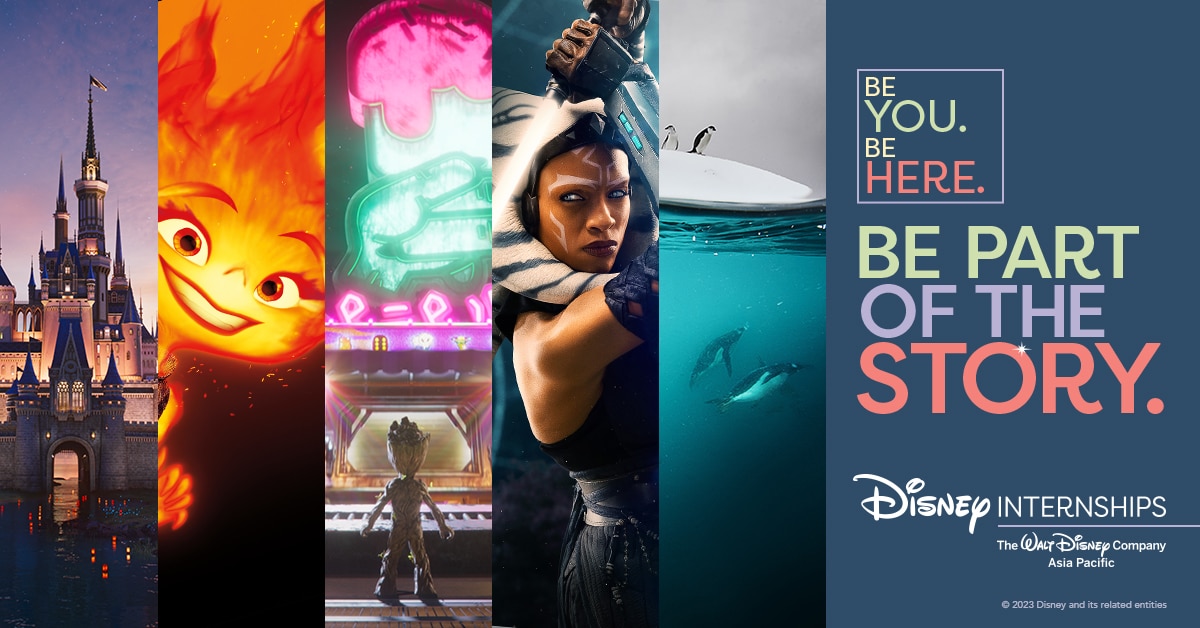
In this campaign, Disney invites potential candidates to be authentic, to join Disney, and to contribute to the history of the legendary brand. 😇
Each image has been carefully chosen and represents something:
- 🏰 Castle: represents the magic and heritage of Disney.
- 🔥 Fire: evokes modern animation and new stories.
- 💡 Neon: symbolizes technology and visual innovation (hello Groot).
- 🌟 Ahsoka Tano (Star Wars character): represents iconic franchises.
- 🐧 Ocean with penguins: illustrates the diversity of content, including nature documentaries.
Example 5: Google recruitment campaign
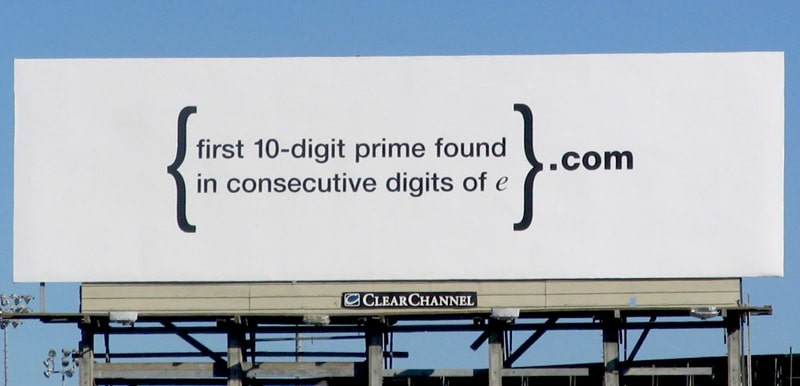
Here, the aim was to recruit talented software engineers and mathematicians without directly announcing that Google was behind the ad. 👀
The billboard displayed a problem, and few people are capable of solving it (I dare you to succeed 🤔).
This strategy encourages those capable of solving the problem to access the website, making the invitation exclusive and attracting the attention of top talent. 💡
Example 6: Best University
To reach students, the University of Florida wants to raise awareness of alcohol abuse and the prevention, treatment and recovery programs available to them. 👀
This starts with a catchphrase from Albert Einstein that makes no sense whatsoever to grab attention. 🤯
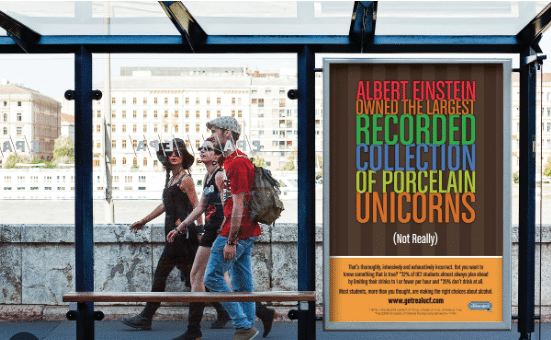
Then, the university reassures students about the potential social pressure of alcohol.
The poster uses a demystifying strategy, showing that exaggerated or erroneous perceptions are not uncommon, and that misconceptions about alcohol consumption can also exist. 👀
Example 7: Ikea recruitment campaign
Last but not least, our favorite furniture brand… Ikea! 🇸🇪

In this campaign, Ikea is targeting individuals who share the company’s values and vision of offering 50% plant-based main courses in restaurants by 2025.
It’s technology meets sustainability.
Ikea encourages entrants to contribute their innovative ideas, while tasting plant-based meatballs prepared using a 3D printer. 🖨️
How about a quick recap?
As you can see, launching an effective recruitment campaign is more than essential if you want to :
- 1️⃣ Attract the best talent.
- 2️⃣ Strengthen your competitiveness.
- 3️⃣ Ensure your growth.
A well-thought-out strategy is the key 🔑 to building a team aligned with your values, and continuing to contribute to your long-term success.
So don’t let this opportunity slip through your fingers, start your recruitment campaign now! 💪🏼
Frequently asked questions
Wait, don’t start your campaign just yet, we’ve got a few other things to tell you first. 🤭
What types of recruitment ads are there?
There are several types of employment contract, but here is a non-exhaustive list: ⬇️
- Professionalization contract.
- Apprenticeship contract.
- Fixed-term contract.
- Seasonal contract.
- Portage salarial.
- Part-time employment.
- Fixed-term contract.
- Interim.
- FIXED-TERM CONTRACT.
- OPEN-ENDED CONTRACT.
What are the 2 recruitment methods?
There are two types of recruitment: 👇🏼
- Internal recruitment: fill vacancies using talent already present within the company. This promotes internal mobility, employee loyalty and reduces recruitment costs.
- External recruitment: looking for candidates from outside the organization. This brings in new blood, new skills and a wider range of profiles.
What are the recruitment channels?
There are several recruitment channels:
- Traditional advertising ➡️ job boards, newspapers, specialized platforms.
- Social network ads ➡️ aims to reach a wider audience and generate direct engagement on LinkedIn, Facebook, Instagram or Twitter.
- Video ads ➡️ provides a dynamic presentation of the company and the position to be filled.
That’s it, you can start your recruitment campaign! See you soon. ✌🏼



